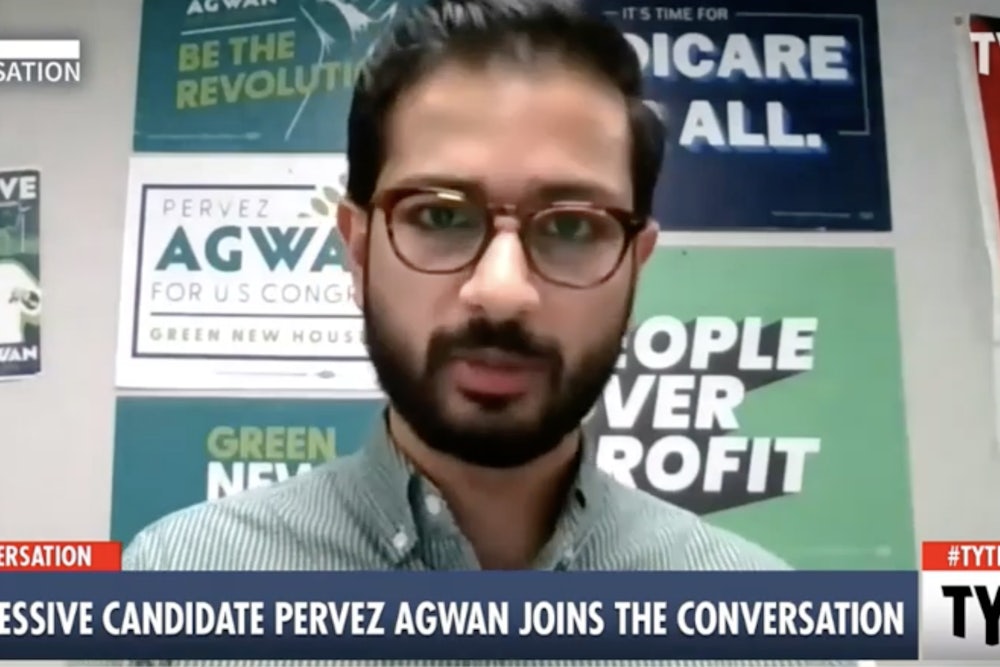In some ways, Pervez Agwan is exactly the kind of progressive the left wants to see in Congress. Unlike his opponent, the oil lobby–funded and AIPAC-endorsed Democrat Lizzie Fletcher, who currently represents Houston’s 7th district, Agwan refuses PAC money, received endorsements from the local DSA and Sunrise chapters, advocates for Medicare for All and a “Green New Houston,” and made his staunch support for Palestine a centerpiece of his campaign. But working with Agwan is a different story.
Former staffers allege that the Agwan campaign oversaw—and ignored—a hostile work environment, where multiple women faced frequent sexual harassment from senior staff, leading 11 people, including almost all women on staff at the time, to resign en masse at the end of October. Moreover, on December 1, one former intern filed a lawsuit claiming Agwan himself made unwanted sexual advances toward her. In response, Agwan told local media the lawsuit was a “dishonest hit-job” by the Israel lobby. (Conversely, before Houston DSA convened to reconsider and ultimately nullify its endorsement, the Agwan campaign rescinded its endorsement request, citing the chapter’s messaging on Palestine.)
“We all believed in him,” said Jasmine Khademakbari, 24, referring to Agwan. Between the time she joined his staff in August and the day she sent her resignation letter two months later, she and several others said they faced unwanted touching and verbal abuse from the campaign’s organizing director, Angelo Perlera. “We all believed in progress.… I was so happy to be working on this cause.” Now they feel disillusioned and betrayed. Since resigning, the staffers have continued to receive communications about Agwan and Perlera that they feel are threatening, including anonymous text messages.
Hours—sometimes minutes—after each staffer emailed their resignation, an attorney representing Agwan sent them a cease and desist letter concerning their “defamatory accusations,” pointing to the nondisclosure agreement they had signed as part of their employment contracts, and claiming that the campaign was running a third-party investigation to determine what had happened. In early November, the staffers received a message from an unknown, New York–based number. “What you kids are doing to Pervez and his reputation is pretty fucked up and you should be ashamed,” it read in part. “You should stop. He treated all of you really well and now I hope he sues you all into the ground if you don’t stop.” (A website using similar language that doxxes the intern who filed the lawsuit against Agwan appeared online briefly in early December.)
The former staffers all expressed some hesitancy about coming forward, in part because of the legal threats but also because they believe a progressive should represent the deep-blue district on Houston’s west side. They worried how their story would be received and are not eager to see the incumbent reelected. Yet if Agwan wins, Khademakbari and a number of former staffers told me they fear for his future employees in Washington. “That is going to be the congressional representative of District 7?” said Jesus Nieto, a former Agwan campaign field organizer who worked under Perlera. “I do not want to see that.”
For Khademakbari, her time on the campaign began to sour after a surprise visit from the police. In late August, as she was settling into her new role, several police officers entered the building and arrested Agwan’s organizing director, Over Santiago Garcia Lopez, 25, on allegations that he had an improper relationship with a student and had recorded sex acts with a child during his previous job as a high school teacher.
Staffers were stunned. Khademakbari feared for the interns, many of whom were teenagers. (Every staffer who has come forward alleging widespread sexual harassment in Agwan’s office is 24 or under. Many are still in college or only recently graduated.) The lawsuit filed by a former Agwan intern notes that interns were “in large majority” young women while “supervisors were by majority male.”
Tanner Russell, 19, worked her way up from an intern position to become staff on Agwan’s campaign. Garcia Lopez repeatedly grabbed her waist and made inappropriate comments about her body, she said. He also interacted with her photos on Instagram and messaged her late at night to invite her out for drinks.
The New Republic reviewed a screenshot of the lockscreen on Russell’s phone from July 1 that shows multiple notifications for direct messages on Instagram from Garcia Lopez. The most recent message appears to have been sent at 11:17 p.m., around six hours after Russell finished work, and says, “What are you up to?”
Uncomfortable, she sent the screenshot to a female co-worker. “Uh ohhh,” the co-worker replied via text, “What’s the plan here?” asking how Russell might de-escalate the situation. “Lmao there is no plan,” Russell replied, “he’s our boss.”
On July 22, Russell said she approached the Agwan campaign’s chief of staff, Alex Inkiow, who apologized for Garcia Lopez’s behavior but said she had to immediately delete the messages he had sent her. “He sat there over my shoulder and watched me delete the messages,” Russell said.
Inkiow confirmed to The New Republic that Russell told him about Garcia Lopez and that “it immediately struck me as offputting that she was getting those kinds of direct messages,” but he denied pressuring her to delete them. Weeks passed without further action by the campaign, Russell said, so she went directly to Agwan. “We’re doing the best we can,” Agwan said, according to Russell. Nothing was done until Garcia Lopez was arrested, at which point he was fired.
Russell said many within the Agwan campaign learned why Garcia Lopez had been arrested from local TV news. When Russell received a text from a friend with a link to the local news article explaining why he’d been arrested, she threw up. “I was just so upset,” she said. Former staffers said Agwan never addressed the matter with the whole team.
Following Garcia Lopez’s arrest, the Agwan campaign hired Angelo Perlera to lead Agwan’s organizing effort
“We were all still really recovering from that arrest,” Khademakbari said, but Perlera offered staff little respite, overseeing a high-intensity campaign from the moment he began his position.
Perlera frequently berated employees for not staying later at work. He also began making unwanted advances on some of the women on staff. “Almost immediately,” states a December 1 lawsuit filed by a former intern, she and other employees were subjected to “his unwanted touching and inappropriate comments.” It started small: Multiple women told The New Republic that they seemed like isolated incidents, not worth reporting, that is, until they realized others were experiencing the same behavior.
Text messages shared with The New Republic show Perlera making comments about several staffers’ appearance. When one former staffer left her desk to go to the bathroom, he sent candid photos of her at her desk that he had taken earlier in the day without her knowledge: “Come back plsssss,” read the text message accompanying the photo. He also inundated Khademakbari with heart emojis throughout the workday, sometimes without any response from her.
From there, they said, Perlera grew bolder: coming up behind them and rubbing their shoulders while they sat at their desks and pressing his body against theirs when they got up to move around the office. “It was very much like wanting to take any opportunity that he could to, I feel like, put his hands on me,” Khademakbari said.
Maha Chishtey, the plaintiff in the lawsuit, went to Agwan directly to notify him of the harassment in early October, the lawsuit states. On October 4, Chishtey received a text from Agwan: “Took care of it,” he said. “Keep me posted if anything happens. It won’t and shouldn’t.” By mid-October, senior staff were aware of Perlera’s behavior toward women employees and had spoken with Inkiow and Agwan about disciplinary actions. Before she resigned, Chishtey and Khademakbari held a private meeting with Agwan about Perlera’s behavior. “He was cursing a lot,” Khademakbari said, “asking why this was happening to him again.”
However, according to the lawsuit, on October 17, after a long workday, Agwan called Chishtey to return to the office. When she arrived, she realized she and Agwan were the only two there. Agwan began “showering her with compliments,” the lawsuit says, engaging her in a long conversation. “After plying Ms. Chishtey with compliments, Agwan put his hands on her and moved closer to kiss her.” Chishtey immediately rejected his advances and tried to leave, but he blocked her exit, attempting to convince her to “succumb to his sexual advances.” When it was clear she wouldn’t, he let her leave.
Chishtey was the first to resign, on October 26, and said in her resignation letter to Agwan, which was obtained by The New Republic, that “I personally came to you to complain about Angelo’s inappropriate comments and unwanted touching. Being aware of this, you still subjected me to your unwanted efforts to engage in sexual activity and did not allow me to leave your office when I rebuffed your advances. Because there is no one in the workplace to protect me from the ongoing sexual harassment and a hostile work environment, I have no choice but to resign.” (Inkiow later sent a similar version of Chishtey’s resignation letter that omitted any direct allegations against Agwan to Khademakbari. Inkiow confirmed sending the resignation letter and said he was unaware of the existence of another version with allegations against Agwan.)
Khademakbari was not fully aware of what Chishtey experienced until they met the Friday after Thanksgiving—weeks after they’d both resigned. One former staffer remembers Agwan saying her departure was due to a family matter and that “this is why we try not to hire college students.”
In the private meeting with Chishtey and Khademakbari, Agwan asked them what they wanted him to do. Khademakbari remembers he proposed two choices: “We can either take the nuclear option,” which Khademakbari interpreted to mean firing Perlera, “or we can do the option that makes him a better man,” which Khademakbari interpreted to mean confronting Perlera and giving him the opportunity to change.
“I think it was unfair of [Agwan] to put that question on us,” Khademakbari said, citing pressure she felt not to choose the nuclear option. “At that time, it seemed like we couldn’t really say that.” That same day, Agwan gathered the campaign’s male staffers and told them that anyone who sexually harassed another employee would be fired.
Perlera and Agwan both declined to comment and referred The New Republic to a press liaison, who said in a statement that the allegations were “unequivocally false” and “we will fight tooth and nail against anyone attempting to derail our grassroots, people-powered campaign.” The statement also says an independent party is currently investigating the allegations. Khademakbari and Nieto both told The New Republic a lawyer reached out saying he was investigating the claims made against Agwan and Perlera but that none of the former staffers have spoken with him.
Agwan’s campaign manager Inkiow confirmed Perlera still holds his position on the campaign. Meeting minutes reviewed by The New Republic show Perlera still actively works with the campaign’s field organizing arm, laboring to feed volunteers accrued through recent pro-Palestine protests into its phone-banking program.
Chishtey declined an interview for this story but released a statement through her attorney: “Growing up as a Muslim-American, South Asian, and a child of Pakistani immigrants in Sugar Land, [Texas] representation was something I treasured greatly,” she wrote. “I was so inspired to see someone who I thought shared the same identities as me fighting for a progressive cause. It’s truly saddening to see that this is the narrative he is choosing to paint.”
Matters came to a head in late October. Khademakbari and several other staff members made a plan to speak with Agwan on October 30 to address Perlera’s behavior.
Khademakbari thought the meeting got off to a promising start; Agwan would say, “I’m with you” and “I hear you,” and cite the fact that he has a wife and kids to imply that he understood. His tone, however, shifted as the conversation drew on. Multiple former staffers said they felt like Agwan was hoping they would vacate their positions so he wouldn’t have to address the situation. Khademakbari also remembers Agwan saying, “OK, so do you guys know anybody who can run a $30,000 to $40,000 field program?”
Inkiow, who had sent words of encouragement before the meeting, said Khademakbari and the other staffers were asking for an “ultimatum” on Perlera’s employment but that “due process” was needed. “I’m in the business of winning,” he added, “and on the ground, I do think that the campaign we’re running reflects the needs of this district.”
Staffers said Agwan left and returned to the room several times to take care of various tasks and show visitors around the office, leaving the women to sit and wait. Having been left to stew for nearly two hours, one staffer packed up and quit on the spot. Others formally resigned the next day. At least 11 people left. The cease and desist letters soon followed. Many are now represented by Chishtey’s attorney.
“When you work on a campaign, you take the job on a moral basis,” Khademakbari said, “because you love the cause and because you believe in your candidate.” She recalled the last event she attended for Agwan’s campaign, a fundraiser where she said he spoke about running an “ethical campaign.” She left early and sent her resignation that night. “I realized I just didn’t believe him anymore.”
Today, she’s unsure what her next step will be. “I’ve been super disappointed with the politicians that we’ve had, even some progressive politicians that I admired a lot when I was growing up,” she said. “But I haven’t lost trust in people, and I haven’t lost trust in what we can do together.… That’s where our power really lies.”




